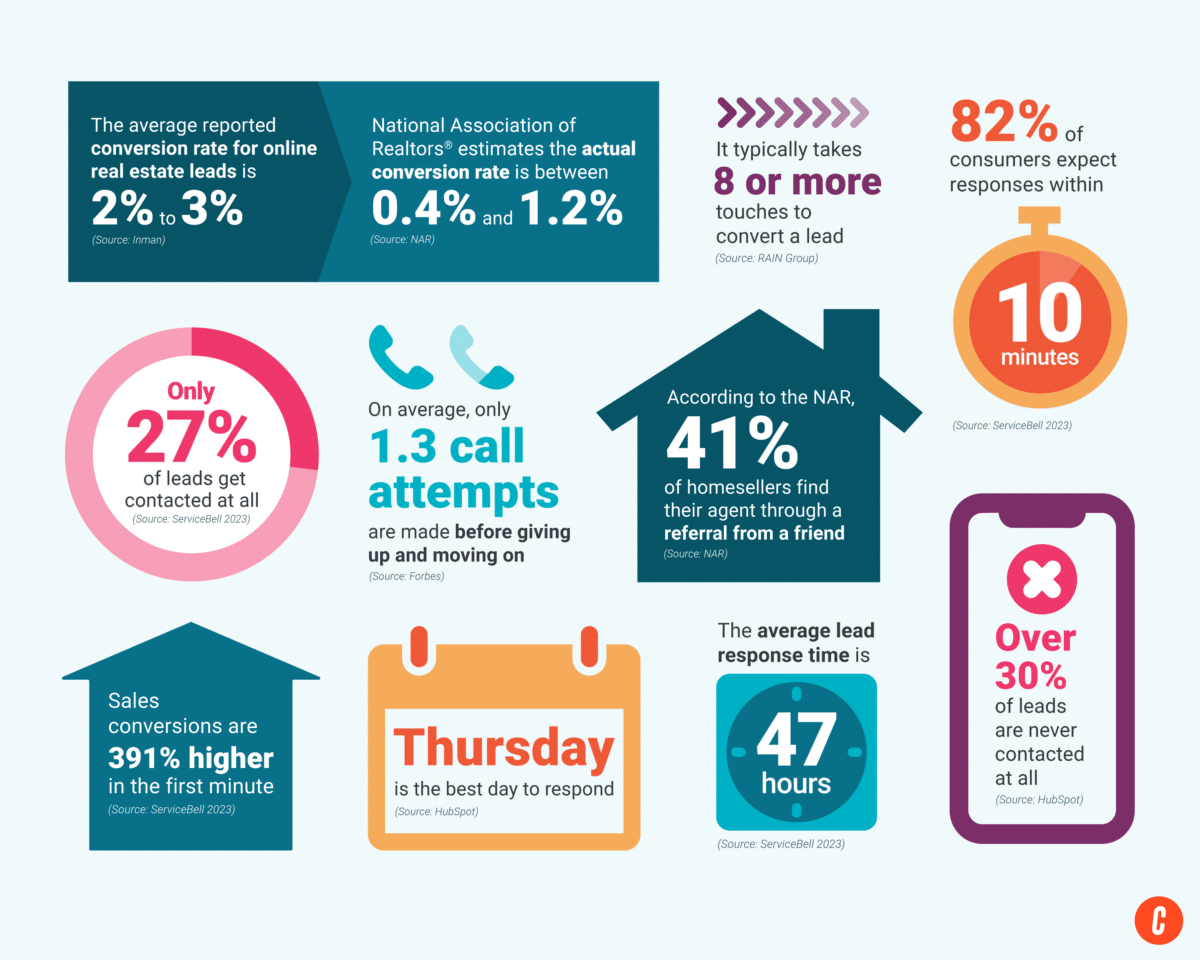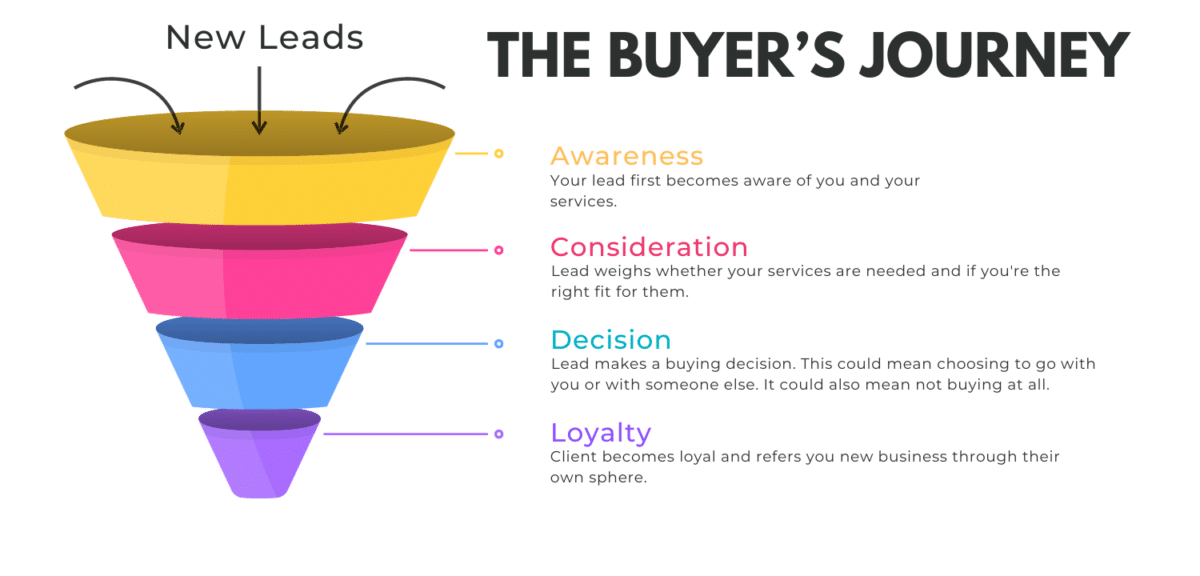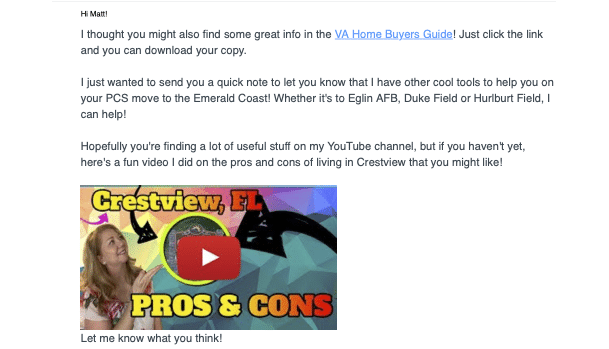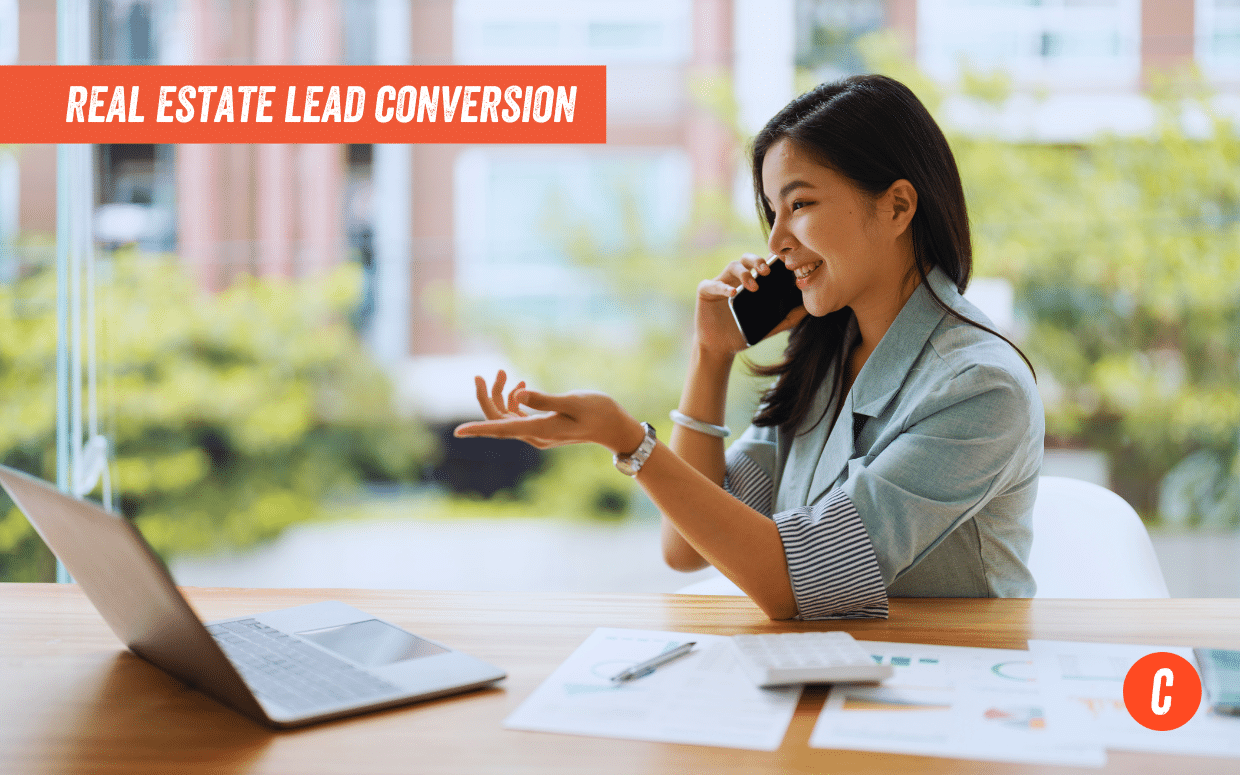Real estate lead conversion is essential for your business to thrive. Throughout my career, I’ve successfully converted hundreds of leads and built a referral-generating database, but it took time to master the art of lead conversion. Cold leads can be challenging, but I significantly improved my lead conversion rate by developing simple strategies and focusing on basic sales techniques.
I’ll cover the fundamentals of real estate lead conversion, share my proven strategies for converting leads, provide tips for scaling your business, and include links to additional resources to support your growth. Let’s dive in.
What Are Leads in Real Estate?
Leads can come from various sources, such as online inquiries, paid lead generation companies, open houses, or referrals. When determining what is a lead in real estate, it’s crucial to distinguish between leads, prospects, and your sphere of influence to target your lead conversion efforts effectively.
- Leads: Potential clients who have expressed interest in your services or properties by providing their contact information or responding to your marketing efforts but have yet to be qualified based on their readiness to buy or sell.
- Prospects: Qualified leads who have engaged in meaningful conversations with you and are actively considering working with you based on their level of interest, financial readiness, and urgency to buy or sell.
- Sphere of Influence (SOI): People who know, like, and trust you, such as past clients, family, friends, and acquaintances. They may refer leads to you or become clients, even if they are not actively looking to buy or sell.
Understanding these distinctions allows you to tailor your approach and allocate resources effectively, from initial contact and lead qualification to nurturing prospects and consistently engaging your sphere of influence for referrals and repeat business.
What Is Lead Conversion?
Lead conversion is turning a potential client (lead) into a closed deal. As real estate agents, we invest significant time and effort into generating leads, but the true reward comes when we convert those leads into sales or listings.
Converting a lead involves building trust, demonstrating expertise, and providing value that differentiates you from your competitors. By understanding and optimizing each stage of the conversion real estate journey, from initial contact to closing the deal, you can create a systematic approach to guide more leads toward successful transactions.
I researched several statistics to give you a big picture view of how vital lead conversion is versus how much you can improve in lead management. Check them out to see how much lead conversion in real estate and other industries can be essential to your overall success.

- The average reported conversion rate for online real estate leads is 2% to 3%. (Source: Inman)
- National Association of Realtors® estimates the actual conversion rate is between 0.4% and 1.2%. (Source: NAR)
- The average lead response time is 47 hours. (Source: ServiceBell 2023)
- Only 27% of leads get contacted at all. (Source: ServiceBell 2023)
- On average, only 1.3 call attempts are made before giving up and moving on. (Source: Forbes)
- It typically takes eight or more touches to convert a lead. (Source: RAIN Group)
- According to the NAR, 41% of homesellers find their agent through a referral from a friend. (Source: NAR)
- Sales conversions are 391% higher in the first minute. (Source: ServiceBell 2023)
- 82% of consumers expect responses within 10 minutes. (Source: ServiceBell 2023)
- Thursday is the best day to respond. (Source: HubSpot)
- Over 30% of leads are never contacted at all. (Source: HubSpot)
When people talk about converting leads, they typically mention conversion rate, which is simply how many leads out of the total you generate usually turn into sales. For example, if you generate 100 leads and five become clients, that’s a 5% conversion rate.
Stages of Lead Conversion: Understanding the Buyer’s Journey
When asking how to convert leads in real estate effectively, it’s critical to understand how buyers and sellers think when making a purchasing decision. By recognizing the psychological process that every person goes through, you can better understand your role in guiding them through their decision-making journey.
The buyer’s journey, also known as the sales funnel or pipeline, is a key concept in lead conversion. The infographic below illustrates the typical stages a buyer goes through when making a purchasing decision.

When you first encounter a lead, whether they’ve come through a lead generation source or organically, they may not be actively seeking your services, so they enter at the top of the funnel, the widest part, and begin working their way through the process. Here are the steps they will follow as they find their way through the funnel.
- Awareness: In the awareness stage, your lead learns about you and the services you provide but may not be in the market for them just yet.
- Consideration: As you continue building a relationship with that lead, they will eventually enter the consideration phase, where they weigh whether or not they need your services.
- Decision: Once your lead has considered all their options, they will enter the decision phase to determine if your services are right for them.
- Loyalty: In this stage, satisfied past clients share their experience with their sphere of influence. They become your evangelists, telling everyone they know how amazing you are. These people are a significant source of referrals that can sustain your business for years. You must pay attention to this phase if you want your business to thrive.
It’s essential to recognize that every person who makes a purchase, from choosing a tube of lipstick to investing in real estate, goes through the buyer’s journey. While the length of time may vary, the mental process remains the same.
The time it takes to convert a real estate lead can vary greatly depending on several factors, such as the lead’s readiness to buy or sell, their specific needs and preferences, and market conditions.
Some leads may be ready to take action immediately, while others may require weeks or months of nurturing before they’re prepared to move. The lead conversion process can take anywhere from a few days to several months.
By understanding and catering to each stage of the buyer’s journey, you can effectively guide your leads through the funnel and ultimately convert them into loyal clients who will support your business for years.
8 Real Estate Lead Conversion Strategies
Now that we’ve covered what lead conversion is, let’s get into my best strategies for converting those leads into sales. These strategies generally apply to all leads, regardless of type.
1. Respond Quickly to Inquiries
You may not want to hear this, but stats show the agent who contacts a lead first is often the one who gets the gig. In fact, 78% of leads work with the first person who responds. Whether an agent receives a call from a paid ad, responds quickly to an inquiry from Zillow, or reaches out to a FSBO, chances are the agent who makes the first contact is the only agent that the lead will interview.
Ideally, you should follow up with a new lead within five minutes of receiving their inquiry. Studies have shown that following up within five minutes can increase your chances of converting a lead by as much as 21 times compared to waiting just 30 minutes. If you can’t respond immediately, aim to make contact within the first hour or at least within 24 hours.
📌 Pro Tip
When you receive an inbound lead, you often won’t be the only agent who receives it. So don’t let your phone go to voicemail. Answer it. And if they don’t answer your calls, send a text, follow-up with an email, and keep following up. Never remove a lead from your pipeline unless they actually say “no.”
After the initial contact, follow up every three to five days with a mix of phone calls, emails, and text messages. This plan keeps you top of mind without being overbearing. Adjust your follow-up frequency based on the lead’s responsiveness and level of engagement. Be prompt and persistent, and provide value to convert leads into clients.
2. Qualify Your Leads
Qualifying a real estate lead is vital for improving your overall lead conversion rate. Determine their readiness to buy or sell to ensure you invest your time and effort in the right prospects. To effectively qualify a lead, ask targeted questions that uncover their motivations, timeline, and financial readiness.
Some key qualifying questions to ask include:
- What prompted you to start considering buying/selling a property?
- What is your ideal timeline for making a move?
- Have you been pre-approved for a mortgage (for buyers), or do you clearly understand your home’s value (for sellers)?
- What are your top priorities in a new home or in the selling process?
- Are there any specific circumstances or challenges I should be aware of?
By asking these qualifying questions and actively listening to the lead’s responses, you can gauge their level of motivation, identify potential obstacles, and determine how best to assist them in their real estate journey. You won’t convert every lead, but understanding where each lead is in the journey can improve your ability to close them in the future. When questioning these leads, the goal is to uncover their needs and assess their readiness to take action, not to pressure them into deciding before they’re ready.
3. Personalize Your Communication
Personalizing your communications with your leads is essential for building trust. By tailoring your approach to each lead’s specific needs, preferences, and interests, you demonstrate you value them as individuals and are committed to helping them achieve their real estate goals.
Here are a few ways to personalize your communications with your leads:
- Gather and use lead data to craft targeted marketing messages.
- Address your leads by name in all of your communications.
- Segment your list of leads based on shared characteristics, such as first-time homebuyers, investors, and luxury buyers.
- Adapt your communication style to match your lead’s preferences (text, email, phone call, etc.).
- Use a customer relationship manager (CRM) or marketing automation platform to personalize your marketing emails at scale.
- Show empathy and acknowledge your leads’ concerns and aspirations in all of your communications.
Personalizing your communication will differentiate you from your competitors, build stronger relationships with your leads and prospects, and increase your likelihood of converting them into clients. Authenticity is your best friend—your leads will appreciate your sincerity, showing you care about their personal needs and goals.
4. Provide Valuable Content & Resources
Building trust with your audience is essential in converting your real estate leads. Creating content helps validate your expertise to those leads who have just entered your funnel. Use your social media, website, blog, and YouTube channel to create value-driven content your audience wants. Deliver entertaining and engaging posts that will encourage your followers to come back again and again.
Here are a few types of content you can create to nurture your fresh leads:
- Educational blog posts:
- “10 Essential Steps to Buying Your First Home”
- “The Ultimate Guide to Preparing Your Home for Sale”
- “Understanding Real Estate Market Trends in [Your Area]”
- Informative email newsletters:
- Monthly market updates and analysis
- Upcoming local events and community happenings
- Showcasing recently sold properties and success stories
- Engaging social media posts:
- Quick tips for homebuyers and sellers
- Polls and questions to encourage interaction
- Live Q&A sessions or virtual open houses
- Helpful lead magnets:
- “The First-time Homebuyer’s Checklist”
- “10 Costly Mistakes to Avoid When Selling Your Home”
- “The Ultimate Moving Checklist and Planner”
- Personalized property recommendations:
- Curated lists of homes that match the lead’s specific criteria
- Neighborhood guides and local market insights
- Virtual tours and property walk-through videos
- Customer testimonials and case studies:
- Showcasing successful transactions and satisfied clients
- Highlighting unique challenges and how you overcame them
- Demonstrating your expertise and dedication to client success
- Educational webinars or workshops:
- “First-time Homebuyer Seminar: What You Need to Know”
- “Maximizing Your Home’s Value: Expert Staging Tips“
- “Navigating the Mortgage Process: A Step-by-Step Guide”
- Seasonal and holiday-themed content:
- “10 Festive Home Decor Ideas for the Holidays”
- “Summer Home Maintenance Checklist”
- “Preparing Your Home for Cooler Weather”
- Local market reports and analysis:
- Quarterly market updates and trends
- Neighborhood-specific market insights
- Comparing local market performance to national trends
- Interactive quizzes and assessments:
- “What’s Your Homebuying Budget?”
- “Is Now the Right Time to Sell Your Home?”
- “Discover Your Dream Neighborhood”
- Video content:
- “Neighborhood Spotlight” video series showcasing local areas
- “Homebuying 101” video course for first-time buyers
- “Ask the Agent” Q&A video series addressing common questions
- “Before and After” home transformation videos
- “Meet the Team” videos introducing yourself and your colleagues
- “Client Success Story” videos featuring past clients’ experiences
- “Home Staging Tips” video tutorials
- “Live Market Update” videos sharing the latest trends and insights
- “Virtual Open House” videos for featured listings
- “Homeowner Hacks” video series with DIY tips and tricks
You can repurpose your content on multiple channels to maximize the reach and use of each piece of content you create. By focusing on topics your leads need or want to know about, you elevate yourself to the top of the market as the neighborhood expert, building trust and becoming a valuable resource.

Video converts 1.6% higher than any other form of content. I started my YouTube channel by creating videos weekly to generate leads. I continued to make videos every week, and my lead generation exploded. The best part is that my videos helped give me credibility, so when my leads were ready, I didn’t have to do much to convert them.
5. Nurture Leads Through Targeted Campaigns
Targeted email campaigns are essential for guiding your newly acquired leads through the buyer’s journey and increasing your conversion real estate rates. Email allows you to share valuable content, personal stories, and insights that resonate with your leads.
Set up targeted drip email campaigns for each lead type, utilizing customizable, ready-made campaigns offered by many CRMs to save time and effort. Consider incorporating the following types of emails in your nurturing campaigns:
- Welcome emails: Introduce yourself, set expectations, and provide an overview of what your leads can expect from your emails.
- Educational emails: Share helpful information about the buying or selling process, such as tips for preparing a home for sale or understanding mortgage options.
- Market update emails: Keep your leads informed about the latest trends and statistics in your local real estate market.
- Personalized emails: Use your leads’ data to send targeted emails that address their specific interests, needs, or concerns.
- Video emails: Personalize your emails by incorporating videos that showcase your expertise, share success stories, or provide virtual property tours.
- Newsletter emails: Start a monthly email newsletter featuring fun and educational content that drives subscribers back to your website.
- Lead magnet emails: Offer useful resources, such as guides, checklists, or e-books, tailored to leads in the decision-making process.
Remember, consistency is key when nurturing leads. Invest time creating a comprehensive nurturing campaign that keeps your leads engaged and moving through the funnel.
Use a CRM like Wise Agent to streamline your lead management and email marketing efforts. With a CRM, you can easily manage your leads, capture them with landing pages, and automate a significant portion of your email campaigns.
6. Engage Leads Through Multiple Channels
Your leads and prospects will be in multiple places. You’ll need to diversify your strategy to increase your chances of reaching them all. You can reach your leads through various channels to stay top of mind and maintain an omnichannel presence.
Here are some ideas for a multi-channel plan of action:
- Email: Send targeted, personalized emails that provide value, educate, and nurture your leads through their journey.
- Phone calls: I know it seems dated, but I recommend following up with leads via phone to establish a more personal connection, answer questions, and gauge their readiness to buy or sell.
- Text messages: Use text messaging for property updates, appointment reminders, or quick check-ins.
- Social media: Engage with leads on social media platforms by sharing relevant content, responding to comments and messages, and showcasing your expertise.
- Video: Incorporate video into your communication strategy, such as property tours, market updates, or personalized messages, to add a human touch and build trust.
- In-person events: Host or attend events, such as open houses, seminars, or community gatherings, to meet leads face-to-face and build relationships.
Make sure your messaging is consistent and on brand. Use a good CRM to track your interactions across channels and provide a seamless experience for your leads and clients. Using a multi-channel approach allows you to meet your leads where they are and provide valuable information where they’re already looking. You’ll be able to build stronger relationships more effectively, increase your chances of converting your leads easier, and grow your real estate business faster.
Need some help getting your social media on track? Coffee & Contracts offers easy-to-use templates, stylish design, and a content calendar to keep your social posts consistent to build that know, like, and trust factor with all your prospects and leads.
7. Leverage Social Proof & Testimonials
One thing that can skyrocket your conversion rate is social proof. Think about how often you are on the fence about purchasing and pop over to Amazon to find product reviews. We need affirmation, and glowing testimonials are the 5-star rating for real estate professionals.
When you’re working with leads, both buyers and sellers, they need to be reassured that you can get the job done for them. Your testimonials will help them feel at ease enough to finally say “yes” and sign on your buyer’s or listing agreement’s bottom line.
📌 Pro Tip
Set up a process to automate your testimonials. You need to do this because most people, no matter how much they loved working with you, will not give you a testimonial after just one ask. In my experience, it’s typically taken at least three times to push them to share their experience. Everyone is busy, and your nudging will be the gentle reminder they need.
I have discovered a secret that removes some obstacles to getting testimonials: Use your smartphone camera to take a video testimonial with your clients at closing. Catch them when they are most willing to share positive thoughts on how awesome you are to work with. Get permission to post those video testimonials on your website.
The best part about video testimonials is their authenticity. They make a much more significant impact on people who are deciding whether or not to work with you. Just like you prefer to see videos of people using products on Amazon, your leads will love seeing people genuinely, in their own words, talk about how fun and professional you are.
Want to see some examples of video testimonials? Check out this article for inspiration: 14 Real Estate Testimonial Examples to Inspire Your Referral Marketing.
8. Continuously Refine Your Lead Conversion Process
If you want to crush it in the real estate game, you can’t just set it and forget it. You must keep your finger on the pulse of your lead conversion process and ensure it’s always running like a well-oiled machine.
Here’s how you can stay on top of your game:
- Track your metrics: Monitor key numbers, such as response times and conversion rates, to determine what’s working and what’s not.
- Analyze and adjust: Regularly examine your data to spot trends and opportunities. If something’s not working, don’t be afraid to change things.
- Test, test, test: Try different strategies and see what resonates with your leads. A/B testing is your friend.
- Listen to your people: Ask your leads and clients for feedback on their experience.
- Stay in the know: Keep up with the latest and greatest in real estate lead conversion. Never stop learning and growing.
- Automate and optimize: Use tools like CRMs to streamline your process and save time. But don’t let them gather dust—keep tweaking and improving!
By constantly refining your lead conversion process, you’ll stay ahead of the curve, turn more leads into raving fans, and watch your business soar. So, don’t be complacent—keep pushing, improving, and crushing it!
Frequently Asked Questions (FAQ)
How can I improve my email open rates when nurturing leads?
To improve your email open rates when nurturing leads, focus on two key elements: compelling subject lines and personalization.
Craft subject lines that are short, specific, and enticing. Pique your lead’s curiosity or address a pain point they may face. For example, instead of “New Listings Alert,” try “3 Homes That Match Your Dream Kitchen Criteria.”
Personalize your emails using your lead’s name in the subject line and throughout the content. Segment your email list based on location, price range, or buyer/seller status, and tailor your messaging accordingly. By sending relevant, personalized content, you’ll build trust and credibility, making your leads more likely to engage with your emails.
What are some common mistakes to avoid in real estate lead conversion?
Improve your conversion of real estate leads by avoiding these pitfalls:
- Being too pushy: Follow up regularly, but don’t be aggressive. Focus on providing value and respecting your lead’s timeline.
- Failing to follow up: Consistency is key. Don’t let too much time pass between touchpoints, or leads may lose interest.
- Not listening to your lead’s needs: Ask questions, listen actively, and tailor your approach to address their specific concerns.
- Neglecting to build trust: Establish credibility and build relationships to encourage leads to do business with you before asking for the sale.
- Ignoring responsiveness: Respond promptly to inquiries to show that you value their business.
By avoiding these mistakes and providing a personalized, value-driven experience for your leads, you’ll improve your conversion rates, grow your real estate business, and add more gross commission income (GCI) to your bank account.
Lead conversion vs lead nurturing: What’s the difference?
The art and science of turning a lead into a sale is called conversion. There are many strategies you can deploy to convert leads. Many times, it may depend on the type of lead or how the lead was generated. But it really comes down to persuading someone to choose you over your competitors.
Nurturing leads is different from converting—nurturing is about building a relationship with leads in the earlier stages of the buyer’s journey. Lead nurturing can help immensely to increase your conversion rate. Savvy agents, including me, use a lead nurturing campaign to help convert their leads.
What is a good lead conversion rate in real estate?
An average real estate lead conversion rate varies based on factors such as lead quality, market conditions, and lead nurturing strategies. However, top-performing agents and teams often aim for a conversion rate of 2% to 5%.
To improve your lead conversion rate:
- Generate high-quality leads that are more likely to convert.
- Implement effective lead nurturing strategies to build trust.
- Continuously track and analyze your conversion data.
- Optimize your follow-up processes for timely and consistent communication.
Focus on providing exceptional value and service throughout the entire conversion process. By building authentic relationships and delivering a seamless, personalized experience, you’ll be better positioned to convert more leads into happy clients who will sing your praises.
Bringing It All Together
Real estate lead conversion is a real, attainable skill. Anyone can learn to be good at converting. But it takes practice and confidence. Implement some of these strategies to scale faster and more efficiently in your real estate business. Work on improving your conversion rates to improve your return on investment (ROI).
Did I miss anything? Have a few real estate conversion tips you want to share? I would love to hear them! Share them in the comment section below.










Add comment